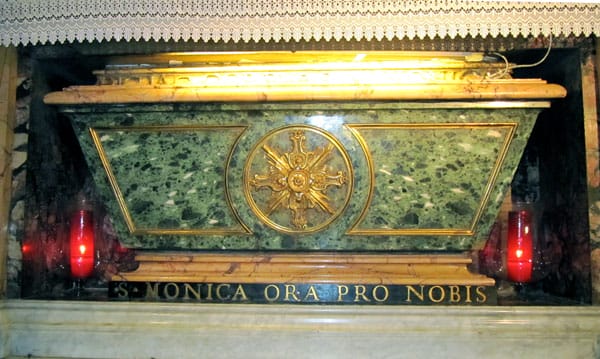The inauguration of the 184th Ordinary General Chapter of the Order of St. Augustine was scheduled last August 28 in Rome. To which ninety (90) representatives of the almost 3000 religious that compose this mendicant Order that originated in Italy in the year 1256 were convoked to attend. What was not programmed was that the inauguration would be presided over by the Pope. However, in one of his unexpected gestures, and for the first time during his five months of pontificate, Francis accepted to preside the opening Eucharist. Eucharist, together with Vespers, that happened in a place of special significance, that of the basilica named after Sts. Trifon and St. Augustine in Campo Marzio.
“St. Monica, tired of hearing me”
This Church situated in the surrounding area of Navona de Roma Square, more than its artistic implications, is in this case relevant for its being the temple where for 400 years (XV-XIX centuries) was the Central House of the Order of St. Augustine. And most especially because since the year 1430 it houses the remains of St. Monica, the mother of St. Augustine. It can be said that she has been the one who has brought Pope Francis to preside this day the Mass in St. Augustine. When still a cardinal he used to stay in the neighbourhood and frequently passed by to visit the Saint. He himself has expressed it in one of his effective phrases: “St. Monica must be tired of hearing me, for the many times that I entered to pray before her tomb”. And, once again, after Mass, he spent some minutes in prayer before the remains of the mother of St. Augustine.
“Our heart is restless”
The entire homily of Pope Francis was a comment on what undoubtedly is the most famous saying of St. Augustine, in the Confessions: “Lord, You have made us for Yourself, and our heart is restless until it rests in You”. The Pontiff spent fifteen minutes in examining the term “restlessness”, trying to see how Augustine lived it and what does the Saint recommend to us today,
At the start, the Pope dealt with restlessness in the sense of spiritual search. He pointed out how Augustine was an authentic success on professional level, even if on account of it he did not abandon the search in its more profound meaning: “ his heart is not asleep; or I should say, is not anaestethized by things, by success, by power. Augustine does not isolate himself, he does not become less active, he continues searching for the truth, the meaning of life”. In this way, Augustine discovers that God was waiting for him. And the Pope makes the application: the example of Augustine challenges the modern man who often has a heart that is atrophied and closed to God.
It is the restlessness that leads Augustine to the encounter with God. In this way he discovers the nearness of God, “Who is more inside of me than I myself”. But he does not stop there either: he does not limit himself in gloating over God, like someone who has already arrived. Augustine continues walking. The restlessness becomes for him a desire of knowing himself better and make himself known to others. It is not what he would have liked to do, but the restlessness of love leads him to accept being bishop and pastor “with smell of sheep”. “The treasure of Augustine is precisely this attitude of always going towards God, always going towards the sheepfold”. And his example has brought the Pope to question all those who listen to him. “Have I made myself comfortable in my Christian life, in my priestly life, in my religious or community life, or do I preserve the power of restlessness for God, for the Word, the leads me towards the exterior, towards others?
The third restlessness that Francis examines is that of love. “On speaking of this”– he says – “I cannot look at the mother”. Monica, like many mothers today, cries for the separation of the children. Francis addresses all of them: “Don’t lose hope in the grace of God”. And he praises all of them in Monica: “A restless woman she is. Augustine was an heir of Monica: from her he received the seed of restlessness”. Francis calls this the restlessness of love, which leads to an endless search for the good of a brother of flesh and bone. And, once again, Francis poses the question: “Do we allow ourselves to become restless for their necessities or do we remain enclosed in ourselves, in our communities, which, many times are for us “commodities” (community-commodity)”.And he puts his finger on where it hurts most: “With sorrow I think about consecrated persons who are not fertile, who are old bachelors. The restlessness of love offers us the gift of spiritual fertility, and we must ask ourselves how is my spiritual fertility, how is my pastoral fruitfulness”.


